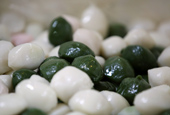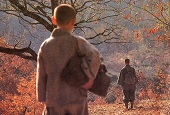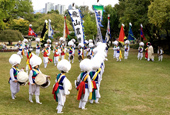- 한국어
- English
- 日本語
- 中文
- العربية
- Español
- Français
- Deutsch
- Pусский
- Tiếng Việt
- Indonesian
This month, we have a nice fat long weekend coming our way (September 6-9 or 10). But before you start making travel plans, first let me explain why you should stay in (or come to) Seoul and what you can do here.
Chuseok is often referred to as “Korean Thanksgiving,” but that’s not a very accurate descriptor, seeing as how Chuseok predates the American and Canadian holidays by over a millennium. Although its origins aren’t clearly known, modern Chuseok is a harvest festival, and South Korean families celebrate it by performing a number of rituals centered around the morning of Chuseok, this year the Monday. They typically show up the night before so the women can spend all day cooking while the men relax. And then in the morning they perform the ancestral rite known as Charye, after which it’s all over and they can return home.
Although Chuseok is technically only one day, it is always buffered by a statutory day off before and after. You see, out of a sense of filial piety, the vast majority of Korean people return to their hometowns for Chuseok. And if you look at population trends in South Korea’s modern history, you’ll see that a good chunk of the Seoul and metro area citizens aren’t living in what they’d call their hometowns. So, they all hit the road to visit their ancestral lands. Those days off are essentially traffic jam days for holiday commuters. Train and bus tickets are booked a month in advance, and travelling by road anywhere in Korea is likely to take more than twice the normal amount of time it would.
In one of my first years in Korea, I recall reading that during one Chuseok, over two million cars were estimated to have left Seoul for Chuseok, containing however many more passengers. Already, that’s more cars leaving the city than actual people leaving in 1950 during the two evacuations of Seoul.
Do you remember the Michael Bay movie Independence Day, when Jeff Goldblum’s character is trying to get to the White House while everyone’s evacuating DC? It looks exactly like that.
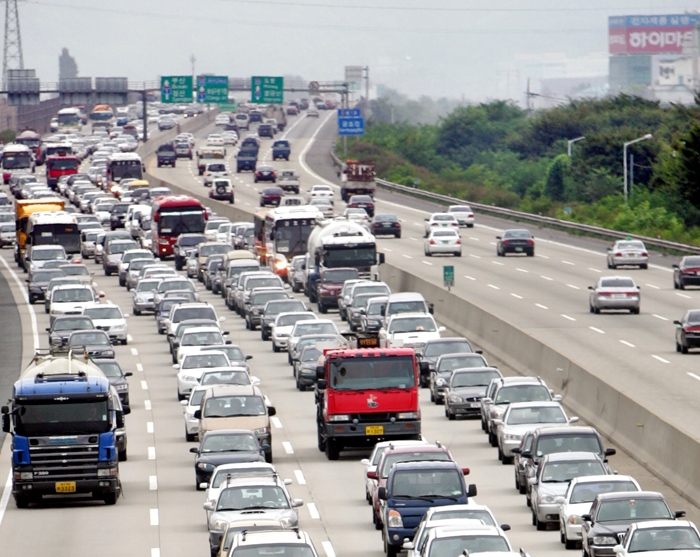
Cars lined up to leave the city. (photo: Yonhap News)
This year, an estimated 4.05 million cars will be on Korea’s roads per day, peaking at 5.04 million on Monday, says the National Police Agency. Almost all of these will be driving away from Seoul sometime prior to Monday morning, and returning back toward Seoul sometime after Monday morning.
During this time holiday (as well as winter’s Lunar New Year long weekend), Seoul has earned a reputation for turning into a ghost town. A high number of stores, markets, department stores, and restaurants can be expected to be closed. For years there was very little to do here for foreigners without family in Korea (as well as Koreans who call Seoul their hometown or are estranged from their families).
But these days, the city undergoes a major demographic transformation during Chuseok, taking on a multicultural character far exceeding what you see during regular weekends. Not only do Koreans clear out by the millions, but as the nation’s factories close, foreign migrant workers employed there take the opportunity to spend a weekend in Seoul.
In recent years, many businesses and tourism organisations have begun offering an increasing variety of events for foreigners stuck in the city over the long weekend. As well, there is an increasing number of activities that become easier to enjoy now that the large crowds are out of the way. Plus, for many foreigners with no family in Korea, this becomes a weekend for parties.
So, during this long weekend, let Seoul or any part of the capital city region connected by subway be your destination. And if you’re outside Seoul, now’s a great time to join us here, as you won’t have to worry about traffic.
1. Amusement Parks
Everland, Lotte World, and Seoul Land always have special cultural events during Chuseok. As well as the holiday programs, you can also expect many of these parks to spring for discounts for foreigners (and in most cases the Koreans who accompany them). The amusement parks will be crowded, more so than usual. As well, if Everland is your destination, I highly recommend taking the Yongin Everline, because you can still expect traffic out in the suburbs that could eat up a few hours of your amusement-riding day.
2. Historic sites
The four main palaces of downtown Seoul — as well as Jongmyo Shrine and the Joseon Royal Tombs — will be open free of admission if you manage to show up wearing traditional Korean Hanbok clothes. As well, Namsangol Hanok Village will have free Chuseok festivities including tteok-making and charye ancestral rites on Monday and Tuesday. The Korean Folk Village in Yongin also has a special Chuseok program, but I would not trust any buses around that area any time this weekend. You can catch the Bundang Line all the way to Sanggal Station now, which puts you a short taxi ride away from the village.
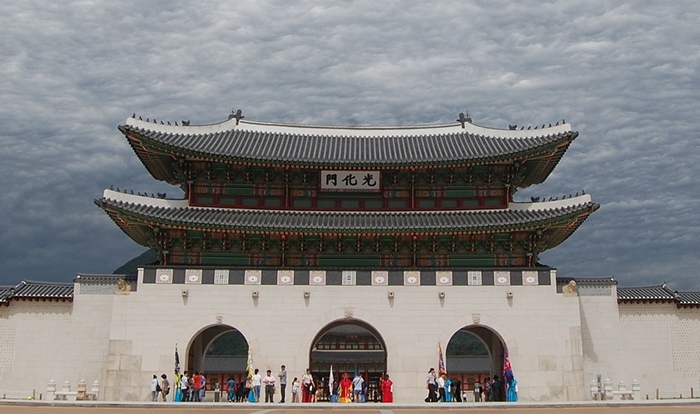
Gwanghwamun, the main front gates of Gyeongbokgung Palace.
3. Museums
Some museums will be closed for the long weekend, but you can count on the National Folk Museum, the National Museum of Korea, the Korean War Memorial in Yongsan, and the Seoul Museum of History to remain open.
The National Folk Museum, on the eastern edge of Gyeongbokgung, offers a full program from Saturday through to Tuesday with over 50 events. Events range in theme from traditional Korean culture to the culture of Korea’s many immigrant populations, this year in particular the Philippines and Uzbekistan.
The National Museum Modern and Contemporary Art, Seoul has its own program from Sunday to Wednesday, with an outdoor musical performance on the first day at 17:00.
4. Little Russia
Gwanghee-dong, a quaint neighbourhood on the corner of Dongdaemun Market, is a well-known multicultural enclave catering mainly to the peoples of the former Soviet republics, including mainly Mongolia, Uzbekistan, and Kazakhstan. This area takes on a new life this weekend, as it is suddenly populated by migrant workers from these countries. A great time to visit and try some exotic foreign foods, and you can be assured that the restaurants will not be closing for this busy weekend.
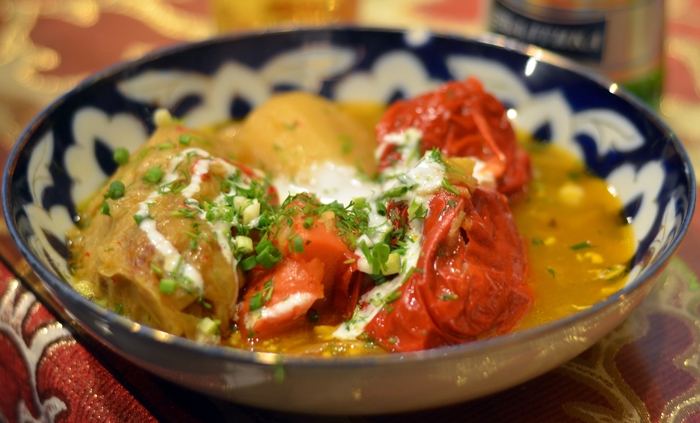
Golubsky at an Uzbekistan restaurant
5. Live music
To make a generalisation, I think you can expect that musicians and artists are a lot less likely to be close to their parents than yuppies. So, the Hongdae businesses that remain open are more likely to earn money than Gangnam businesses. Hongdae will still have concerts this weekend. Here are some options for Saturday night:
- -At Prism Hall, legendary punk band Suck Stuff will be releasing their latest EP, backed by punk bands including Rux, 1Ton, Skasucks, Resolute, Patients, and Rosemary.
-The instrumental funk band Funkafric Boostdah will be performing in Strange Fruit.
-There will also be a noraebang party at Yogiga Expression Gallery. Want to know what that’s about? It’s only 5000 won. - -And on Sunday, German group Hyenaz will be finishing their Korean tour with a show at Club Bbang, alongside Korean garage punk band the Veggers, multicultural band Magna Fall, and one-man band GT Arpe.
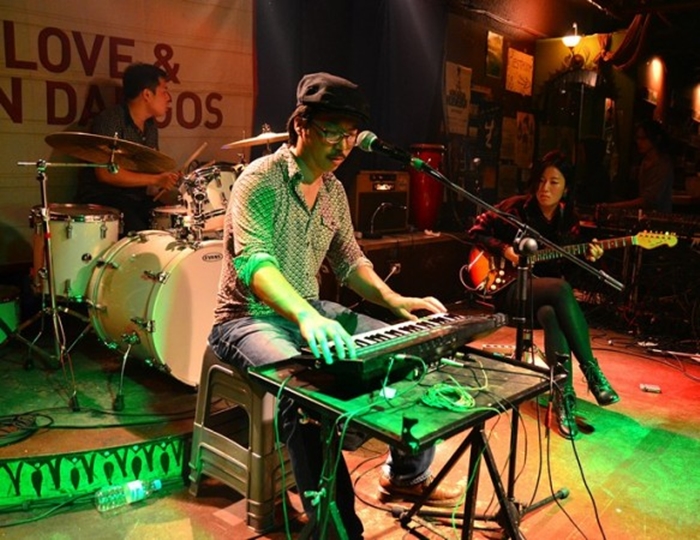
Funkafric Boostdah, fronted by keyboardist Lim Ji-hoon
6. Climb a mountain
Fall is the perfect time of year to climb a mountain, and we have no shortage of mountains within the Seoul metro area. The crowds will be greatly reduced, and as long as there isn’t rain, the weather should be just about right for the start of Korean mountain climbing season.
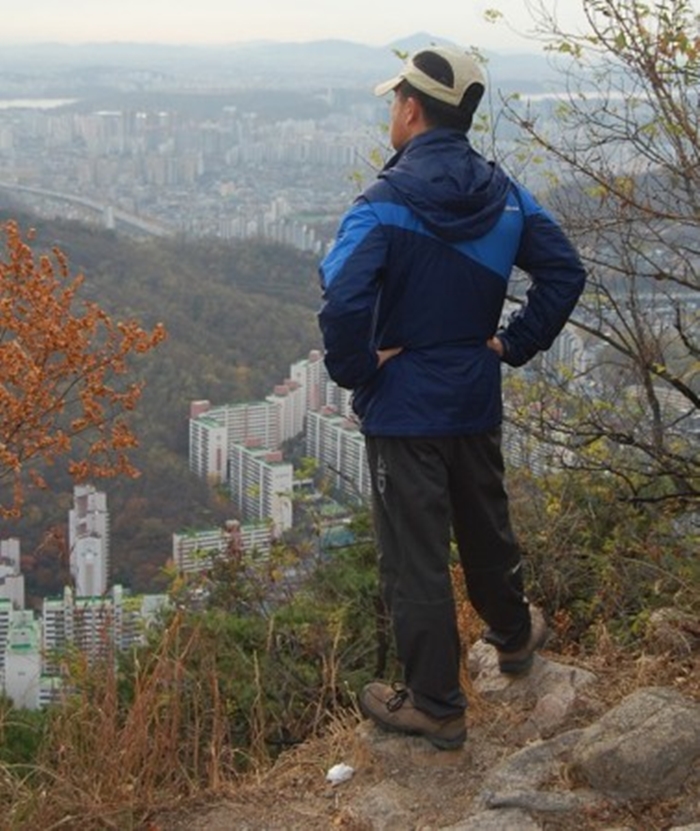
The view from Inwangsan.
7. Suwon Hwaseong Fortress
Or you can leave the city by metro and visit Suwon Hwaseong Fortress, combining historical attraction with a robust climb up an inner-city mountain. But it’s probably safest to do this before Chuseok, as you don’t want to be overwhelmed by traffic heading back to Seoul on your way home (assuming you’re living in Seoul). As a bonus, you can get almost all the way there by subway.
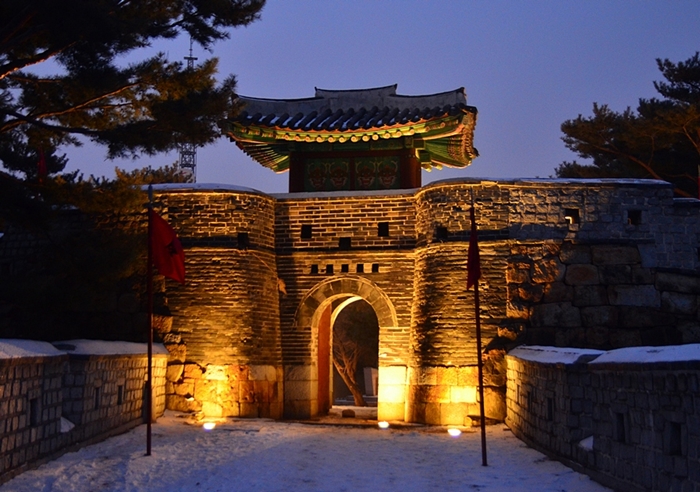
Suwon Hwaseong Fortress at night.
8. Yongyu Island
Yes, there are beaches accessible on the Seoul Metro line, so there’s no need to fight traffic for two days just for a small patch of sand on one of Busan’s beaches. The AREX airport line offers trains out past Incheon International Airport to Yongyu Temporary Station, where you’ll be close to a number of Yellow Sea beaches. The train runs ten times a day, starting from 7:29am departing Seoul until the last one departing Yongyu at 7:31pm. We had a very weak summer this year, but there’s still enough of a chance we’ll have another day hot enough for beach weather before the long weekend is over. Even if not, the beaches here are great for having a barbecue and spending the night in a pension.
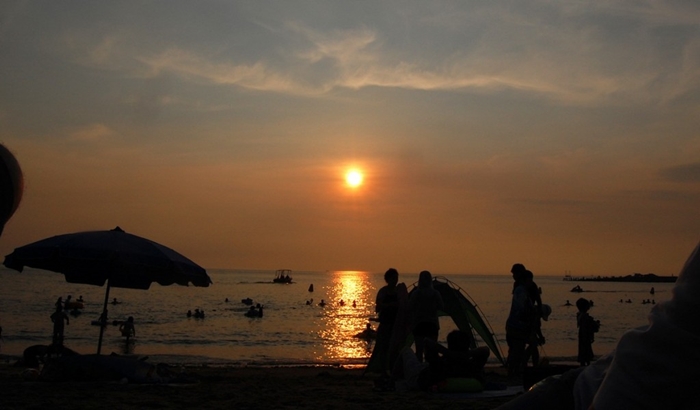
Eulwangri is one of many beaches just a quick bus ride from Yongyu Temporary Station.
9. Attend a soccer/football game
There will be several games held in the Seoul metro area throughout the long weekend.
- Suwon Samsung Bluewings vs Busan I’Park – Saturday 19:00 at Suwon World Cup Stadium
Seongnam Ilhwa Cheonma vs Incheon United – Saturday 19:00 at Tancheon Sports Complex (Yatap Station on Bundang Line, exit 3)
Korea vs Uruguay – Monday 20:00 at Goyang Stadium (Daehwa Station at the end of Line 3, exit 3)
Seongnam Ilhwa Cheonma vs FC Seoul – Wednesday 19:30 at Tancheon Sports Complex (Yatap Station on Bundang Line, exit 3)
Suwon Samsung Bluewings vs Ulsan Hyundai – Wednesday 19:00 at Suwon World Cup Stadium
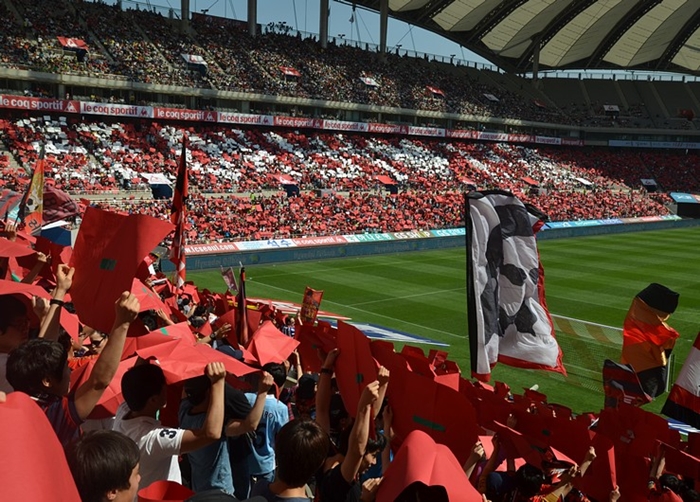
My advice: always sit in the supporters’ section behind the net. FC Seoul and Suwon Bluewings fans are known for their passion (which necessitates an increased police presence when they play against each other).
10. Watch a baseball game
There are even more baseball games this long weekend.
- Doosan Bears vs LG – Friday 18:10 at Jamsil
NC vs Nexen – Friday 18:30 at Mokdong
SK vs Doosan Bears – Saturday 17:00 at Jamsil
Lotte vs Nexen – Saturday 17:00 at Mokdong
SK vs Doosan Bears – Sunday 14:00 at Jamsil
Lotte vs Nexen – Sunday 14:00 at Mokdong
Hanhwa vs Nexen – Tuesday 14:00 at Mokdong
Hanhwa vs Nexen – Wednesday 14:00 at Mokdong
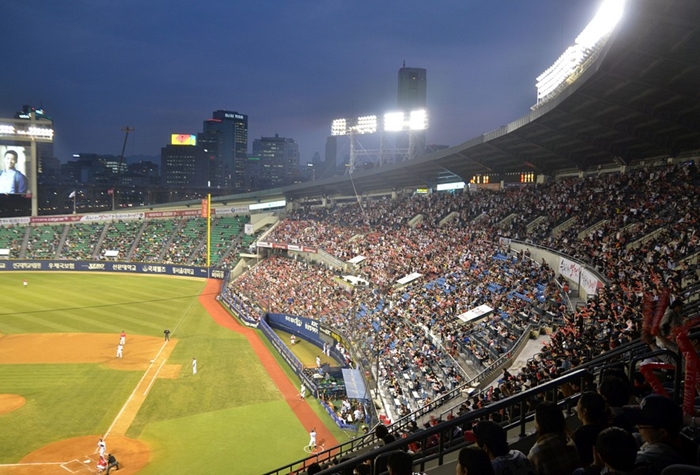
11. Watch a film
Korea can be kind of a letdown for foreign film buffs who don’t speak the local language. Fortunately there are options out there. This Saturday afternoon, the Seoul Film Society will offer a free screening of Obaltan, a 1961 Korean masterpiece by director Yoo Hyeon-Mok, at Seoul Global Cultural Center in Myeongdong.
There is also a special Chuseok schedule of independent Korean films being screened with English subtitles at Indie Space, a movie house next door to Seoul History Museum and Gyeonghee Palace. They’ll be showing a series of animated shorts based on Korean literature by Ahn Jae-hun and Han Hye-jin, the 2014 LGBT film Night Flight by Leesong Hee-il, and acclaimed director O Muel’s Golden Chariot in the Sky. Check their website for screening times and further information.
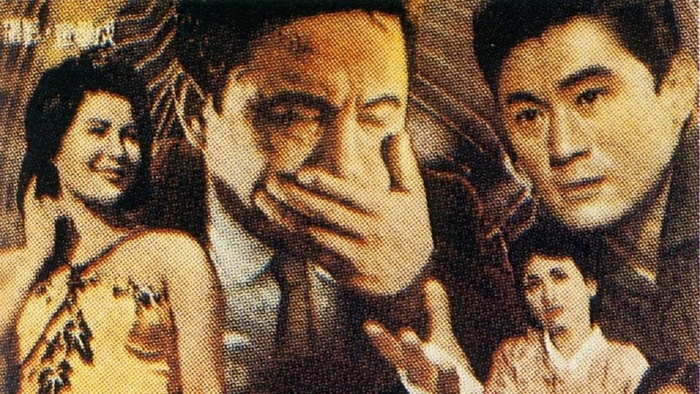
Obaltan
Recently I’ve had to talk a number of new exchange university students in Korea out of travelling down to Busan, about the worst thing you can do this weekend. I really probably should’ve added it to my recent article about international students.
So, if you’re wondering what to do this Chuseok, either stay in Seoul or come to Seoul.
Written by Jon Dunbar on September 4, 2014 in Travel, Worldwide Korea Bloggers
